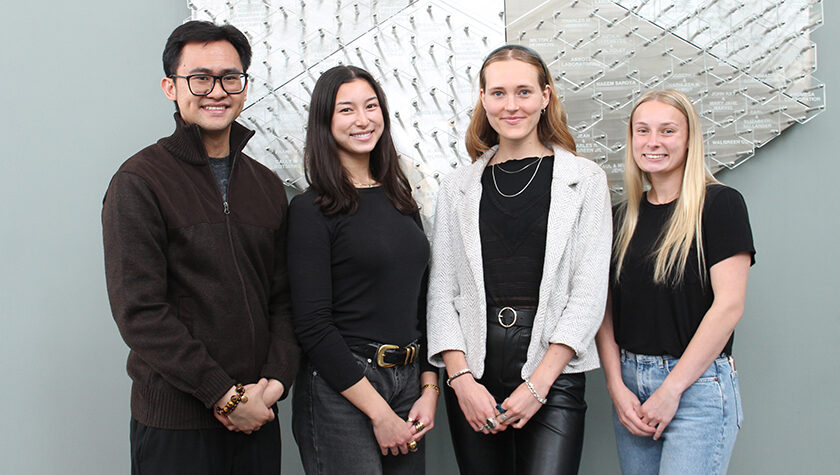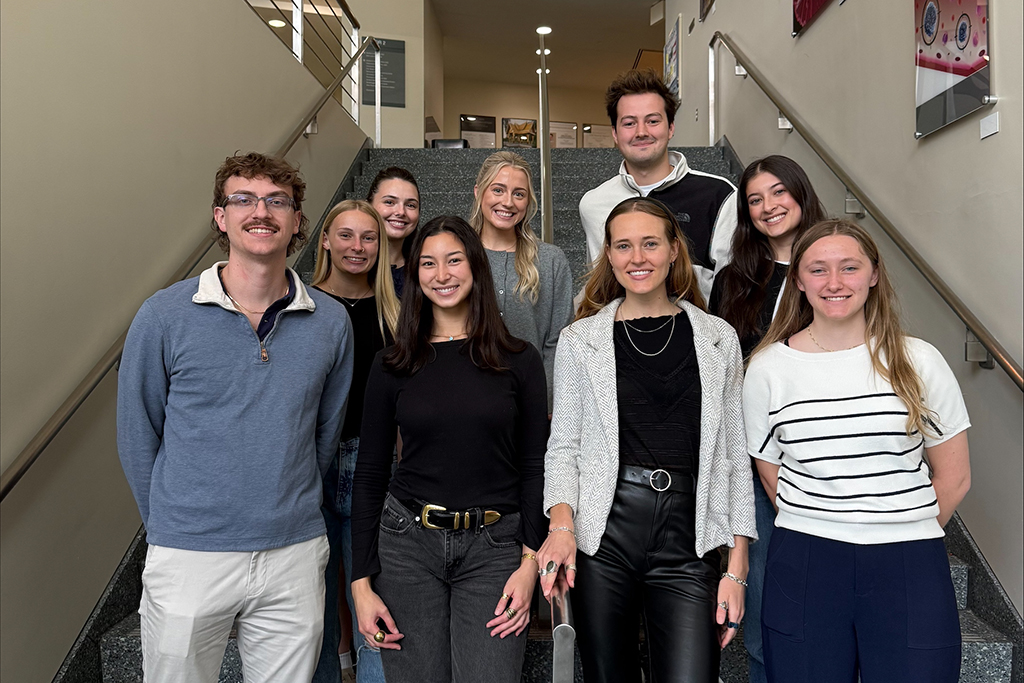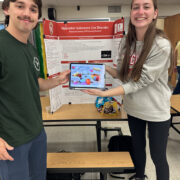
6
June

The UW–Madison School of Pharmacy team places sixth nationally in the Value of Industry Pharmacists Case Competition
By Logan Underwood
What does it take to bring a new cancer therapy to market? For a team of PharmD students at the University of Wisconsin–Madison School of Pharmacy, the answer included late nights, regulatory deep dives, and a fictional drug called Prostiga.
As part of the national Value of Industry Pharmacists (VIP) Case Competition, hosted by the Industry Pharmacists Organization (IPhO), the team tackled a real-world challenge: Design a plan to take an assigned drug through the development pipeline — from clinical testing to Food and Drug Administration approval and product launch. By the end of the competition, which features three rounds, teams present a comprehensive drug profile, highlighting industry pharmacists’ roles in marketing, regulatory affairs, medical affairs, and clinical development.
“It was very validating because we put in so much effort. It was really good to hear that it was worth it.”
—Makenzie Hansen
The UW–Madison School of Pharmacy’s team’s simulated drug development plan scored 98%, placing sixth out of more than 70 schools nationwide and earning the highest score in the School’s history since joining the competition in 2017.
“I was definitely surprised,” says PharmD student Makenzie Hansen, president of the School’s IPhO student chapter. “It was very validating because we put in so much effort. It was really good to hear that it was worth it.”
Path to success
The team’s work started in October when Hansen, serving as the local competition chair and clinical development lead, received the details of the generic drug assigned by IPhO. The team was given the generic drug Vipadenleucel-T, an autologous cell immunotherapy used to treat prostate cancer. Together, they transformed and modified the drug, giving it the brand name Prostiga.
“A challenge was that nobody had learned about prostate cancer in our courses yet,” says Hansen. “Everyone had to learn from square one.”
As the clinical development lead, Hansen worked with her team to plan out the early stages of development. To set themselves apart from other teams and existing prostate cancer treatments on the market, Prostiga utilized the patient’s own cells to treat the cancer. The one-time therapy was quick and would carry fewer side effects than chemotherapy or radiation.

Next, the medical affairs and regulatory affairs functional leads — fourth-year PharmD student Sophia Castillo and fourth-year PharmD student Theo Buna — took over. While medical affairs determined how to convey vital information about Prostiga to clinicians and patients, the regulatory affairs team outlined the process of FDA approval.
“Dr. Ann Parks served as the mentor for my medical affairs functional area, and all of our success can be attributed to her insights and mentorship,” says Castillo.
Castillo, along with other functional leads, was paired with an industry mentor to gain a clearer picture of what the real-life process would be like. Parks, a medical outcomes specialist at Pfizer, was joined by Joe Ware, a pharmaceutical clinical development consultant; Noah Kaitz (PharmD ’23), a clinical scientist fellow at Gilead Sciences; Terry Ocheltree, who has extensive experience in regulatory affairs; and Paul Rosowski (BS ‘87, MS ‘94), a clinical account director at AstraZeneca.
Finally, the marketing arm of the team, led by fourth-year PharmD student Emma Hoedel, determined how they would launch Prostiga. Hoedel, along with the other functional leads, was paired with an alumni mentor to gain a clearer picture of what the VIP Case Competition judges were looking for.
“Dr. Rozowski was able to give us his industry side of experience. He played a huge role in getting our midpoint submission very fine-tuned,” says Hoedel. “We had really good mentors this year that were very quick to respond and very quick to help.”
A leadership experience
The midpoint submission, which the team completed in December 2024, provided all of the necessary components of the development plan. The final submission in February 2025 built upon the original plan, offering more details and specifics that elevated the Prostiga even further — and earned the team a score of 100% and five extra points for professionalism. The team earned a spot in the top 10 out of more than 70 teams, a designation the School’s IPhO chapter has never reached before.
“Doing the IPhO Case Competition definitely helps boost your experiences overall in leadership skills, so I’m glad I could have that experience.”
—Theo Buna
“As students, many of us have not been this involved in guiding the drug development process until participating in the competition,” says Castillo. “This competition helped me further appreciate the considerations at different stages in the lifecycle of a therapeutic.”
Buna, the functional lead for regulatory affairs, first joined the IPhO as a first-year PharmD student, competing in the VIP Case Competition for the past three years. Not only is he glad to see the team reach a new peak, but he’s also enjoyed the experience of being able to expand on his critical leadership skills.
“It was good to see things progress in the span of three years to the success that we have now,” says Buna. “I’m glad that I could do it, despite all the other challenges. Doing the IPhO Case Competition definitely helps boost your experiences overall in leadership skills, so I’m glad I could have that experience.”






